
At Mid-Year 2023, WAMS Data Show Global Decrease in Merger Filing Notifications, with Significant Declines in U.S. and EU Merger Filings
WAMS Database Reaches the 100-Jurisdiction Mark
14 min read
White & Case Global Antitrust Merger StatPak (WAMS)—the first real-time clearinghouse for global merger notification data—has analyzed merger notifications in reporting jurisdictions around the first half of calendar year 2023 (H1 2023: January 1, 2023 – June 30, 2023). WAMS has also analyzed end of fiscal year 2022 data for reporting jurisdictions where the data only recently became available.
More from WAMS
White & Case Global Antitrust Merger StatPak
White & Case Antitrust/ Competition is a “one-stop shop for global deals.”
The Legal 500 US
WAMS@100
White & Case is proud to announce that its WAMS database is now tracking 100 merger control jurisdictions around the globe. WAMS began in the Fall of 2021 with just over 30 merger jurisdictions, but now surpasses the century mark. WAMS@100 aggregates and analyzes data from the Americas, Europe, Asia (South Asia, Asia-Pacific, Central Asia, and the Middle East), and Africa (North Africa and sub-Saharan Africa).
United States: U.S. Merger Control Filings in H1 2023 Are Down Approximately 35% Compared to Same Period in 2022 While New Regulatory Hurdles to Mergers Have Been Announced
While merger enforcement has continued to increase in the United States, January 1, 2023 – June 30, 2023 ("H1 2023") has shown a notable cooling off period for HSR premerger filings from the levels reached in 2021 and 2022, where U.S. M&A activity was hot and HSR merger filings were at all-time-record high levels. HSR premerger filings in H1 2023 dropped 35% compared to H1 2022 and dropped 50% compared to H1 2021.
In March 2023 and April 2023, there were only 122 and 120 HSR filings in the United States, respectively. These figures rose slightly back up in May 2023 (144 U.S. HSR filings) and June 2023 (159 U.S. HSR filings), respectively.
Together, March 2023 and April 2023 HSR filings represent the lowest monthly HSR filing figures since April 2020 and May 2020, which were the months following the onset of the Covid-19 pandemic. Outside of the pandemic months, these U.S. HSR figures are the lowest since January 2016, which reported only 117 HSR filings.
In late June 2023 and July 2023, U.S. antitrust authorities announced sweeping changes to the HSR premerger notification Form,1 and to the U.S. Merger Guidelines, replacing the 2010 Horizonal Merger Guidelines and the 2020 Vertical Merger Guidelines (collectively, the "Merger Guidelines").2 To read more about these developments and what they mean for you, visit White & Case's client alerts here and here.
Looking ahead: In early H2 2023, the White House announced "promoting competition" as one of its three pillars that are central to the White House's economic vision, known as "Bidenomics." This announcement portends increased competition enforcement across several industries and may impact merger activity going into 2024.3
The HSR Form and Merger Guideline changes are expected to go formally into effect in Q4 2023 or Q1 2024. These key developments – before and after implementation – will almost certainly affect U.S. premerger notification filing trends in the coming months.
With respect to the proposed changes regarding HSR filings, if the proposed rule is finalized, merging parties will face expansive reporting requirements for HSR filings and lengthy filing preparation times, on par with the Form CO in Europe, with narratives on product market and market shares anticipated and additional document productions. With respect to the proposed changes regarding the Merger Guidelines, if the proposed guidelines are finalized, they will establish an expansive enforcement framework that would potentially push the boundaries of prior practice by adopting new theories of anticompetitive harm. However, it remains to be seen whether courts will accept the proposed Merger Guidelines as a persuasive framework to analyze a merger when an antitrust agency tries to block a deal in court.
These regulatory developments have been concerning to dealmakers and these concerns may be reflected in the decreasing notifications during the first few months of 2023. WAMS 100 will closely analyze U.S. notification data to assess how U.S. filings have changed since the announcements and implement of the proposed changes and since the incorporation of competition as a key pillar in the White House's economic policy.
European Union: H1 2023 Merger Filings Control Notifications Are Down Approximately 20% Compared to H1 2022
- WAMS 100 tracks the following jurisdictions in Europe: Austria, Belgium, Bulgaria, Croatia, Cyprus, Czech Republic, Denmark, Estonia, EU, Finland, France, Germany, Greece, Hungary, Ireland, Italy, Latvia, Lithuania, Malta, Netherlands, Poland, Portugal, Romania, Slovakia, Slovenia, Spain, and Sweden
In Europe, merger control notifications to the European Commission during H1 2023 (January 1, 2023 – June 30, 2023) are down approximately 20% compared to the number of notifications in H1 2022 (January 1, 2022 – June 30, 2022), which may indicate a decline in the M&A activity in Europe. During H1 2023, the European Commission received 151 notifications, and of those, 143 transactions were cleared without commitments. Five of the notified cases went to Phase II in H1 2023, which is slightly more compared to three Phase II proceedings launched in H1 2022. Two (out of five) mergers that went to Phase II in H1 2003 were in the digital sector,4 compared to three5 (out of eight) Phase II digital mergers in the entire last year 2022. This suggests that the number of digital mergers investigated in Phase II in 2023 could be higher than in 2022.
The long-awaited judgment of the Court of Justice of the European Union (CJEU) in CK Telecoms was delivered just after the end of H1 2023. In this landmark ruling, the CJEU held that for the EC to block a merger or require remedies, it needs to show based on "a cogent and consistent body of evidence" that a merger "more likely than not" will result in a significant impediment to effective competition.
The CJEU notably dismissed the higher standard of "strong probability" suggested by the lower court, as well as the more demanding test to challenge mergers in oligopolistic markets, which had been adopted by the lower court. The judgment is expected to provide the EC with renewed confidence to challenge mergers, particularly in oligopolistic markets and based on novel theories of harm. Overall, it is a major win for the EC and could be viewed as an endorsement of the more interventionistic approach to merger control that started during Margrethe Vestager's second term.
Looking ahead: Digital deals, including vertical and conglomerate mergers, will continue to be in the spotlight in the EU in 2023 and beyond. Notably, in September 2023 the European Commission vetoed Booking Holdings/Etraveli over a conglomerate ecosystems theory of harm. This is the first prohibition decision of the European Commission based purely on ecosystem concerns. The European Commision has voiced foreclosure concerns as well as a concern over Amazon strengthening its position as a leading online marketplace.6 Outcomes of these cases may have a wider relevance for other digital platform acquirers, especially for larger tech companies planning to acquire targets active in adjacent markets.
Nordic Region: H1 2023 Merger Notifications Lower than H1 2023, but Are Up in Finland Compared to H1 2022 Levels
- WAMS 100 tracks the following jurisdictions in the Nordic Region: Denmark, Faroe Islands, Finland, Iceland, Norway, Sweden
Merger filing activity in the Nordic region sends mixed messages, with filings up in some jurisdictions, but down in others. Overall, H1 2023 merger filings activity from three Nordic jurisdictions shows a cumulative decrease as compared to H1 2022.
In Finland, merger notifications to the Finnish Competition and Consumer Authority increased from 14 in H1 2022 to 24 in H1 2023, suggesting that year-end merger notifications in 2023 will likely be significantly higher than in 2022. The jump in filings is likely a consequence of Finland lowering its merger filing thresholds at the beginning of 2023. For more information on the new Finnish thresholds, see White & Case's client alert here.
In Sweden, filings to the Swedish Competition Authority decreased from 68 in H1 2022 to 40 in H1 2023, suggesting that Swedish notifications for 2023 will likely be lower than in 2022. H1 2023 filing activity is down 20% as compared to the preceding five-year average of 50, but H12023 notifications are similar to pre-2021 levels.
In Norway, merger notifications to the Norwegian Competition Authority (NCA) in H1 2023 decreased by nearly 50% in comparison to H1 2022 (from 104 to 54). H1 2023 also saw the Norwegian Supreme Court issue its first judgment in a merger control case since the adoption of Norway's Competition Act in 2004. The Supreme Court overturned the NCA's merger prohibition decision on the ground that the parties were not competitors in the same market. Separately, in H1 2023, the NCA has blocked one acquisition.
Ukraine: Competition Authority Continues to Analyze Transactions in H1 2023 As Russia's War in Ukraine Continues
From January 1 – June 30, 2023, the Antimonopoly Committee of Ukraine (AMCU) reviewed approximately 250 notifications. This number is higher than the number of the notification reviewed during the same period last year (the period during which the AMCU was inactive for a few months). Looking forward the overall number of notifications in 2023 is expected to be comparable with 2022.
The AMCU, which operates from Kyiv, has remained active and has continued to maintain normal statutory review timelines. During H1 2023, the AMCU initiated three phase II investigations in the areas of stevedoring and warehousing services as well as consumer panel services and retail measurement services. Notably, in one case, the AMCU cleared the merger subject to structural remedies (in H2 2023). This is the first instance of proper structural remedies applied by the AMCU in a merger control case. The authority also continued its enforcement activities. It imposed five fines for failure to notify a merger in H1 2023, including a gun-jumping fine of USD 680,000 in the pharmaceutical sector, which is so far the highest fine this year.
Looking ahead: White & Case expects the AMCU to continue prioritizing the banking, financial services, energy, fuel, and construction materials sectors in H2 2023. On August 9, 2023, the Parliament of Ukraine adopted a law that, among other things, amends the seller's turnover allocation rules in the thresholds calculation and exempts non-controlling minority acquisitions from the scope of review. The new law is expected to enter into force on January 1, 2024. It aims to bring Ukrainian merger control rules closer to the EU regime and reduce the number of the notifiable mergers which have no local nexus in Ukraine, although some of the no-nexus deals might still be caught in Ukraine. On September 7, 2023, a new head of the competition authority was appointed in Ukraine. The new leadership is expected to continue reforming the agency in accordance with Ukraine's objective of European integration.
Australia and Asia-Pacific Region 2022 Highlights
- WAMS 100 tracks the following jurisdictions in the Australia and Asia Pacific Region: Australia, China, Fiji, French Polynesia, Hong Kong, Indonesia, Japan, Mongolia, New Caledonia, New Zealand, Pakistan, Papua New Guinea, Philippines, Singapore, South Korea, Taiwan, Thailand, and Vietnam
Japan: FY2022 Merger Filings Down 9.2% Compared To FY2021
In Japan, merger notifications to the Japan Fair Trade Commission (JFTC) fell to 306 in FY2022 (1 April 2022 – 31 March 2023), down 9.2% compared to FY2021. This reflects a return to just below the historical 5-year average of 307 (FY2017-FY2021), from a high of 337 in Fiscal Year 2021.
South Korea: 2022 Merger Filings Nearly 25% Above Historical Five-Year Average While Proposed Legislative Amendments Seek To Respond To These Increases
In H1 2023, South Korea proposed expanding the scope of exemptions from merger notification requirements to include (i) inter-affiliate mergers, (ii) establishment of private equity funds and (iii) interlocking directorships of less than ½ of the board members. The proposals seek to address the increasing number of notifications the Korea Federal Trade Commission ("KFTC") has received in recent years.
If approved by the South Korea National Assembly, White & Case expects the amendments to reduce the merger filing burden on companies. Based on WAMS data, South Korean merger filing activity for 2022 remained 25% higher than the historical 5-year average (2017-2021).
Australia: Proposed amendments to Australian competition laws may significantly increase merger filings in 2024
During H1 2023, the Australian Competition and Consumer Commission (ACCC) announced its detailed proposal for a mandatory and suspensory merger law reform in Australia. The proposal is a significant shift from the current informal clearance regime in Australia. To read more about what the proposal entails, we encourage you to read White & Case's client alert here.
The ACCC expects to publish Australian merger filing data for the Financial Year ended 30 June 2023 later in Q4 2023 in its Annual Report. As reported in Q4 2022, merger notifications in Australia have been on an upswing. Notifications in Australia were up 39% above the four-year fiscal year average of FY 2017 – FY 2021 and this trend is expected to continue into FY 2022.
Looking ahead: White & Case expects the amendments will go into effect in 2024. The threshold applied to mandatory clearance will be key to the effective operation of the regime and may substantially increase merger filings.
Latin America H1 2023 Highlights
- WAMS tracks the following jurisdictions in Latin America and the Caribbean: Argentina, Barbados, Brazil, Chile, Colombia, Costa Rica, Curaçao, Ecuador, Honduras, Nicaragua, Paraguay, Peru, Trinidad & Tobago, and Uruguay
Mexico: Merger Filing Activity Drops in H1 2023 Potentially As a Result of New Levels of Scrutiny
Merger notifications in H1 2023 dropped 30% compared to the same period in 2022. In H1 2023, there were only 70 merger notifications, as compared to 100 notifications in H1 2022. This could be as a result of increased enforcement by the Mexican competition authority, Comisión Federal de Competencia Económica (COFECE).
Since 2022, COFECE has taken an aggressive approach to merger enforcement. COFECE is actively reviewing and assessing common ownership among notifying parties and it is examining transactions post-closing to ensure parties adequately notified prior deals. As a result of this scrutiny, parties have experienced longer review periods.
Looking ahead: The three seats on the COFECE board of commissioners that were vacant for months were filled in early 2023. The nominations happened after the Mexican Supreme Court issued a ruling that forced the executive branch to nominate individuals for the three vacant positions in COFECE's decision-making body. With these nominations, COFECE has resumed its review of important cases and is able to make decisions that require a five-member quorum. The new commissions have previous experience working at COFECE and are well regarded. Recently, COFECE's new chairperson announced the possibility of reviewing the methodology used to calculate fines for violations to the antitrust statute including for gun jumping or unlawful mergers.
Brazil: H1 2023 Merger Notifications Decrease 20% Compared to H1 2022, But Remain Slightly Above Historical Five-Year Averages
WAMS 100 data show decreasing merger control filings in Brazil in H1 2023 as compared to previous years. So far in 2023, Brazil filing activity is down roughly 20 percent compared to H1 2022. WAMS 100 data also show that H1 2023 merger filings in Brazil remain 6% above the historical five-year period (2018-2022).
Looking ahead: On July 20, 2023, CADE issued for comment draft guidelines for assessing vertical and conglomerate mergers. The consultation period is open until September 18, 2023 and CADE is expected to take into account any comments submitted by interested parties in the drafting of the final guidelines. Furthermore, CADE will continue to conduct technical studies on a possible review of the merger filing criteria in Brazil. Lastly, four of CADE's Commissioners (out of seven) will end their terms in the second half of 2023, so the majority of CADE's Tribunal will soon be constituted by new Commissioners. Note however that there is a bill proposing to reduce the number of CADE's Commissioners from seven to five, and if such bill is approved the nomination of new Commissioners may be impacted.
WAMS@100: A continuing effort
WAMS is proud to have reached 100 jurisdictions with input from White & Case's antitrust and competition practices across the world, and with support from its vast network of local counsel from around the world. We hope WAMS will continue to prompt greater transparency and additional real-time reporting by antitrust merger control authorities around the world. Transparency assists merging parties in complying with the law.
The WAMS team is comprised of White & Case's global network of antitrust professionals, with particular contributions from J. Mark Gidley, George L. Paul, Katarzyna Czapracka, Strati Sakellariou-Witt, Tamer Nagy, Stefanie Benson, Belinda Harvey, Thilo-Maximilian Wienke, Henri Capin Gally, Gabriela Baca, Joao Lacerda, Roman Gonzalez Melo, Marika Harjula, Ashley Stoner, Rucha Phadtare, Andrew Hamm, Rachael Stowasser, Anastasia Bodnar, Marios Gavriiloglou, Nina Frie, Esma Aktas, and Tony Lopez.
1 White & Case LLP, You're gonna need a bigger boat: Stormy waters ahead as the FTC proposes far-reaching changes to HSR Form (June 30, 2023), https://www.whitecase.com/insight-alert/youre-gonna-need-bigger-boat-stormy-waters-ahead-ftc-proposes-far-reaching-changes.
2 White & Case LLP, U.S. Antitrust Agencies Propose Sweeping Changes to Merger Guidelines – 5 Key Things You Need to Know (July 20, 2023), https://www.whitecase.com/insight-alert/us-antitrust-agencies-propose-sweeping-changes-merger-guidelines-5-key-things-you.
3 The White House, "Bidenomics Is Working: The President’s Plan Grows the Economy from the Middle Out and Bottom Up—Not the Top Down," available at https://www.whitehouse.gov/briefing-room/statements-releases/2023/06/28/bidenomics-is-working-the-presidents-plan-grows-the-economy-from-the-middle-out-and-bottom-up-not-the-top-down/.
4 Adobe/Figma, Amazon/iRobot
5 Broadcom/Vmware, Booking Holdings/Etraveli, Microsoft/Activision Blizzard
6 The decision is currently expected probably for the beginning of 2024. The clock has been stopped since 29 August 2023. Before the suspension, European Commission had until 13 December to decide.
White & Case means the international legal practice comprising White & Case LLP, a New York State registered limited liability partnership, White & Case LLP, a limited liability partnership incorporated under English law and all other affiliated partnerships, companies and entities.
This article is prepared for the general information of interested persons. It is not, and does not attempt to be, comprehensive in nature. Due to the general nature of its content, it should not be regarded as legal advice.
© 2023 White & Case LLP

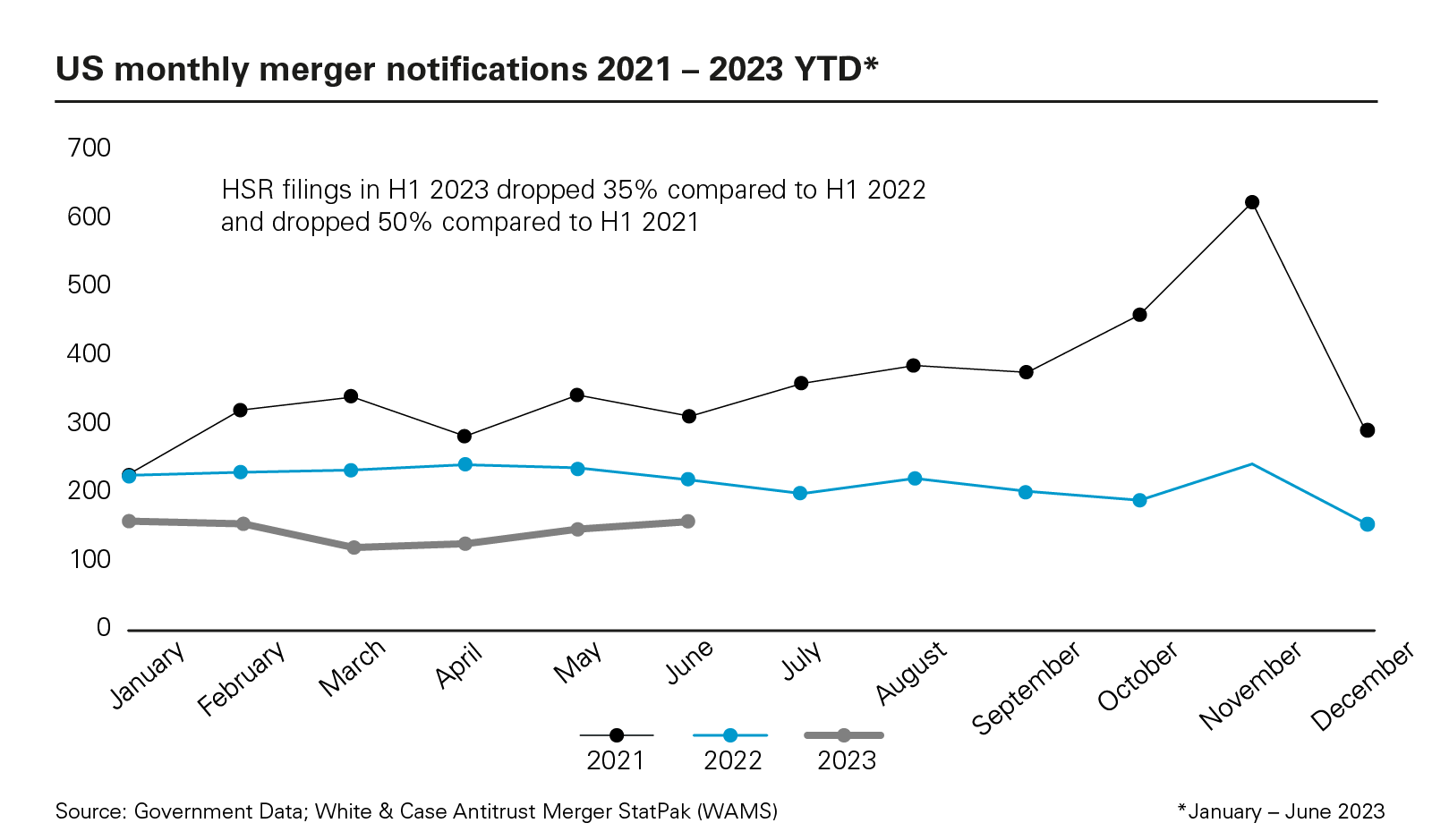 View full image: US monthly merger notification 2021 - 2023 YTD* (PDF)
View full image: US monthly merger notification 2021 - 2023 YTD* (PDF)
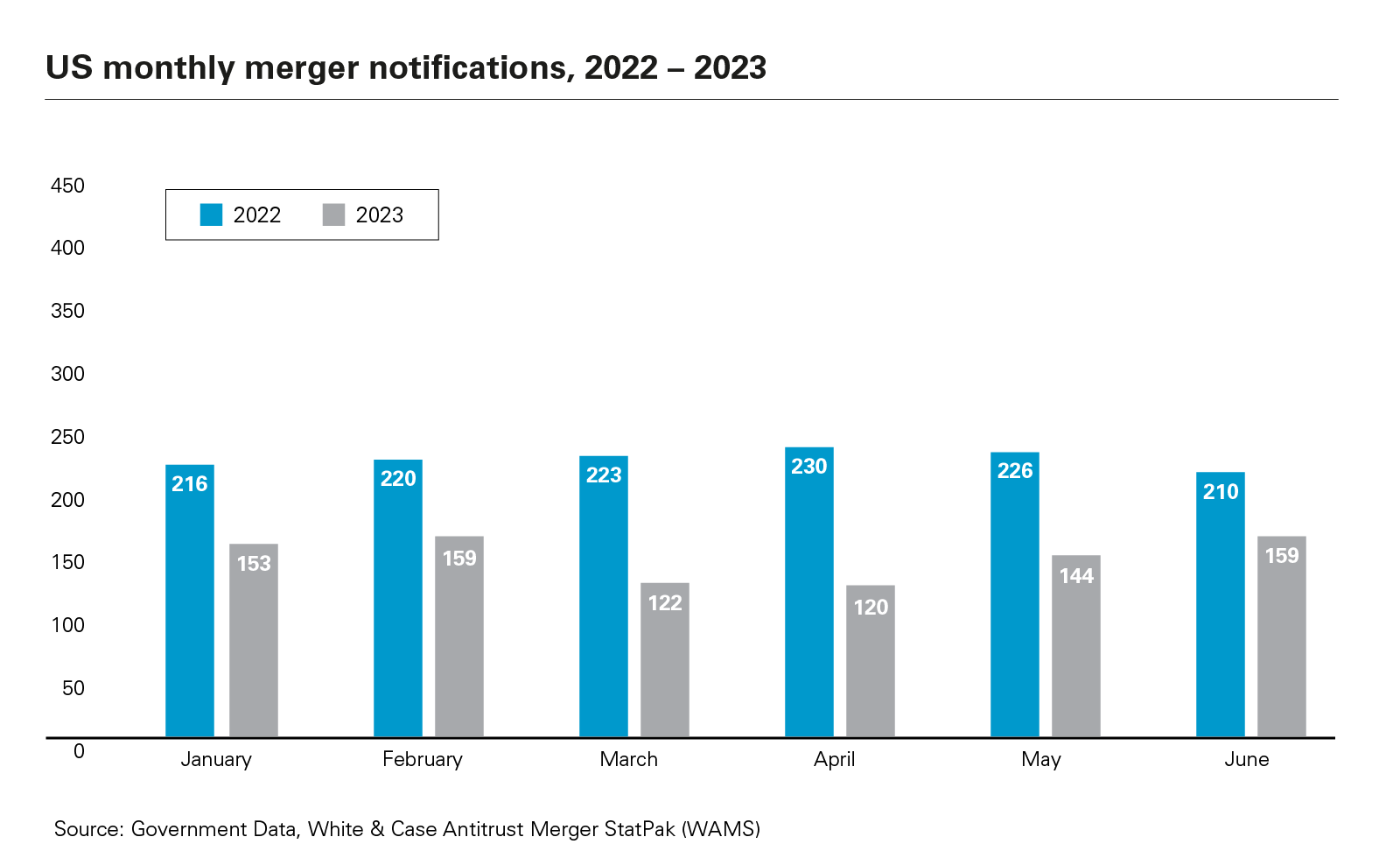 View full image: US monthly merger notificatcations, 2022 - 2023 graph (PDF)
View full image: US monthly merger notificatcations, 2022 - 2023 graph (PDF)
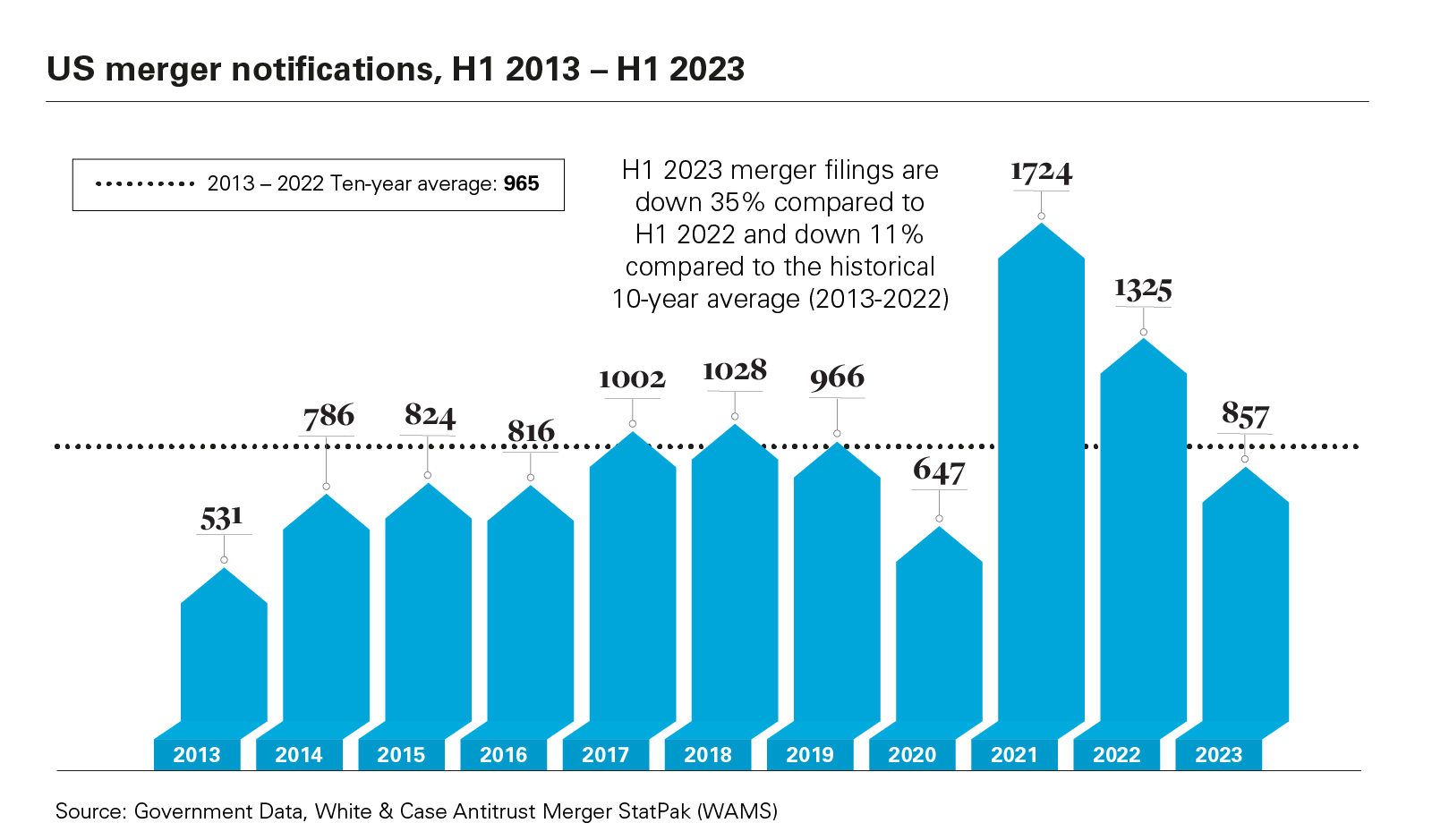 View full image: US merger notifications, H1 2013 - H1 2023 graph (PDF)
View full image: US merger notifications, H1 2013 - H1 2023 graph (PDF)
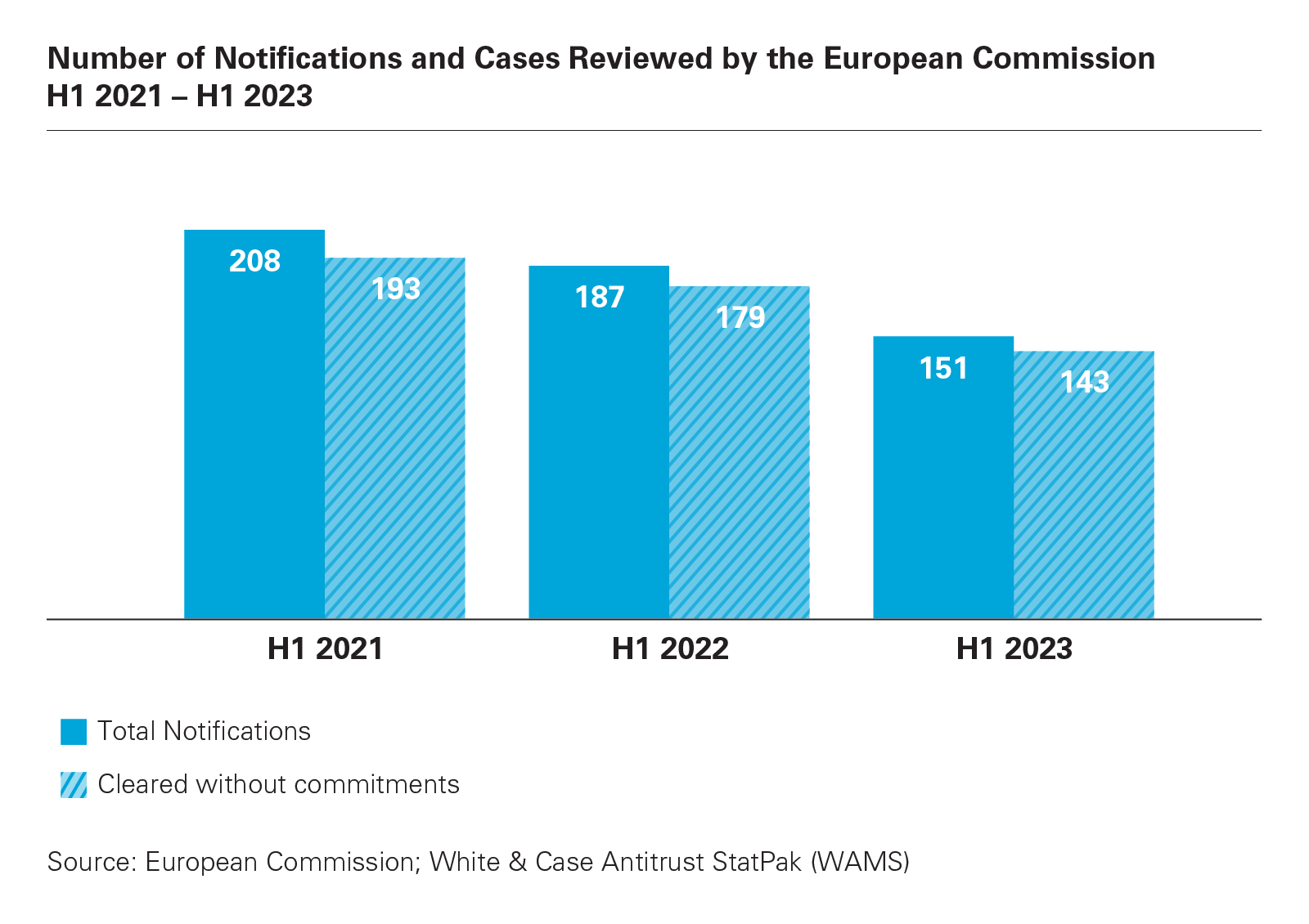 View full image: Number of Notifications and Cases Reviewed by the European Commission H1 2021 - H1 2023 graph (PDF)
View full image: Number of Notifications and Cases Reviewed by the European Commission H1 2021 - H1 2023 graph (PDF)
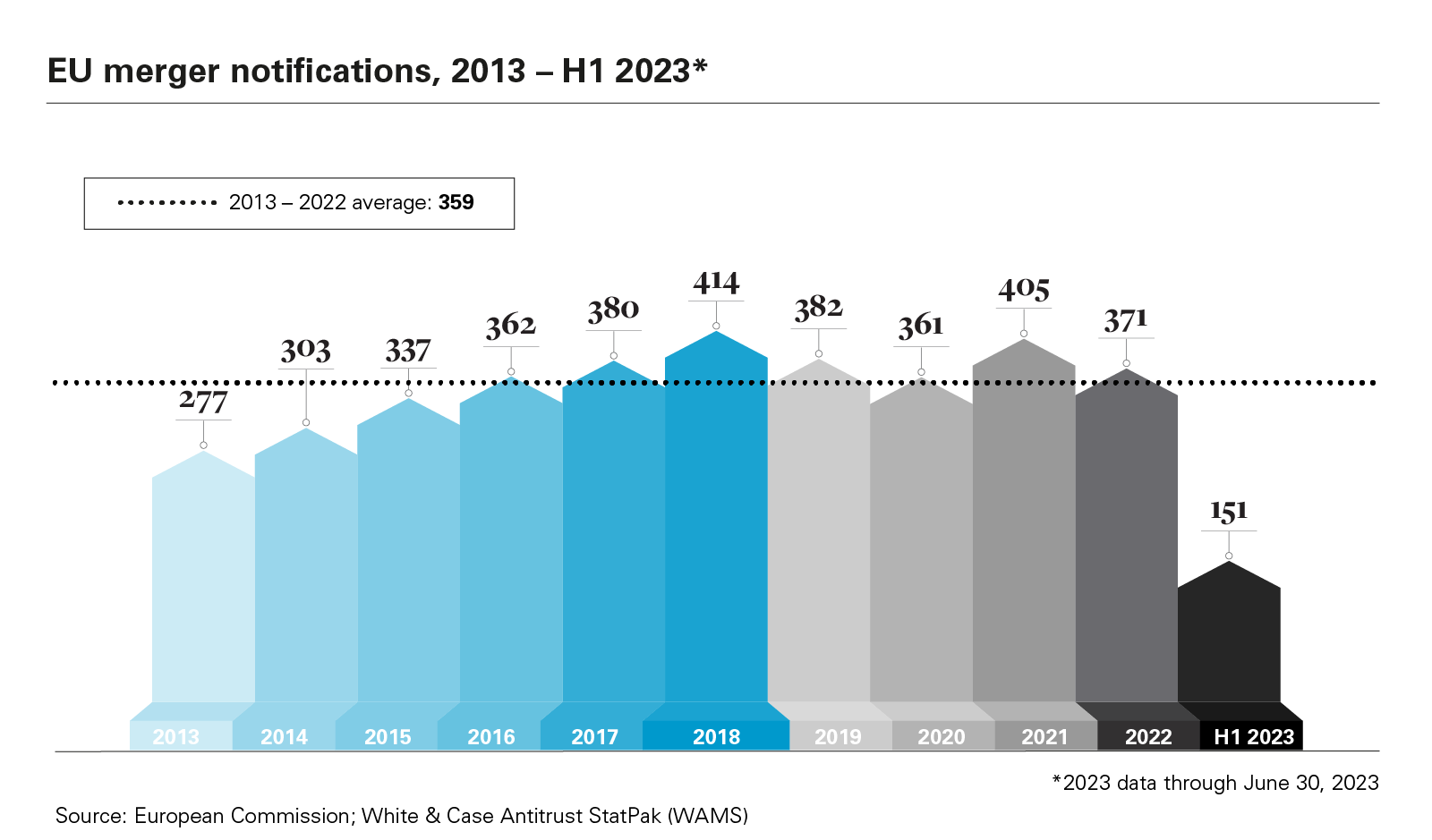 View full image: EU merger notifications, 2013 - H1 2023* graph (PDF)
View full image: EU merger notifications, 2013 - H1 2023* graph (PDF)
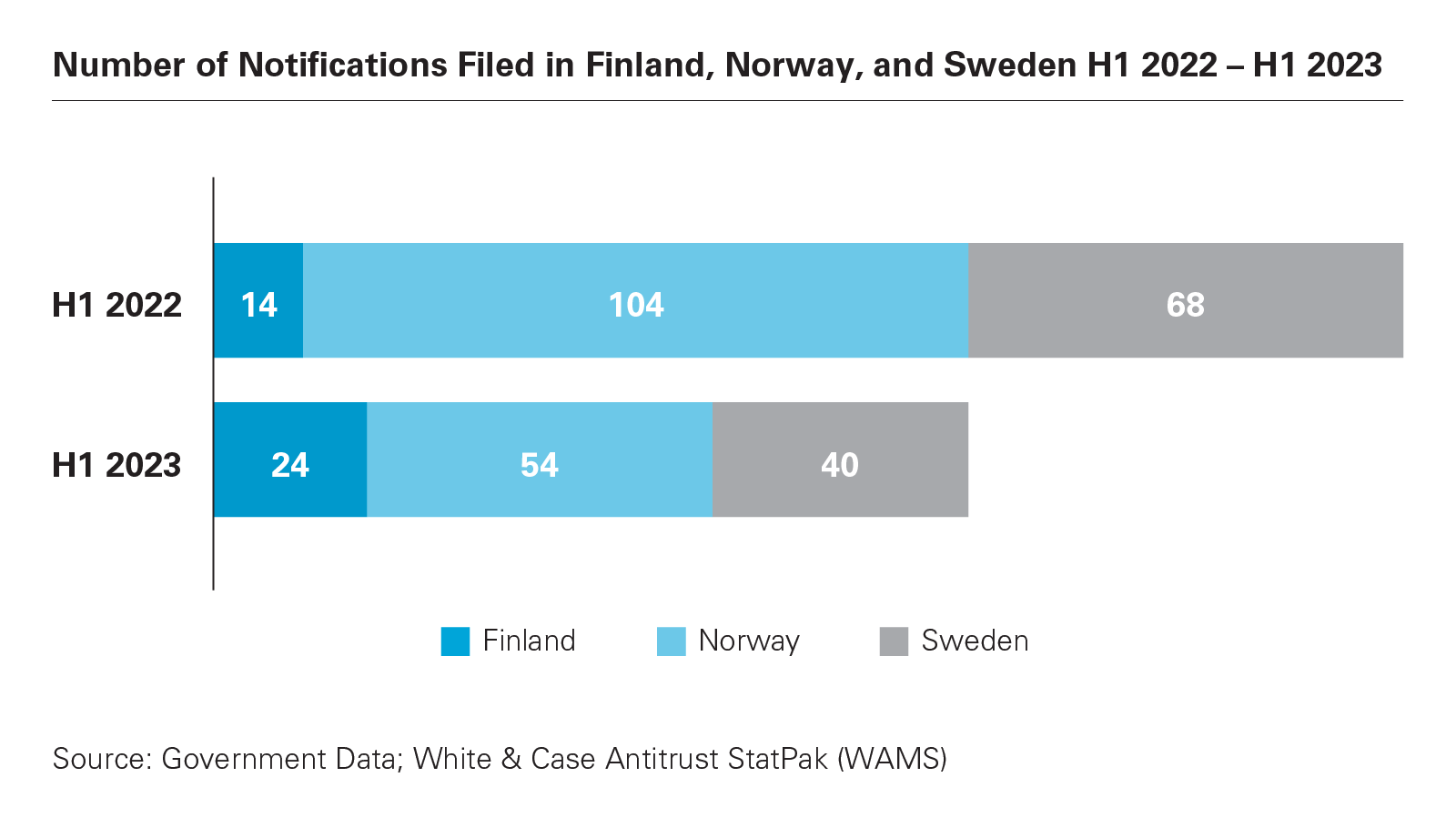 View full image: Number of Notifications Filed in Finland, Norway, and Sweden H1 2022 - 2023 graph (PDF)
View full image: Number of Notifications Filed in Finland, Norway, and Sweden H1 2022 - 2023 graph (PDF)
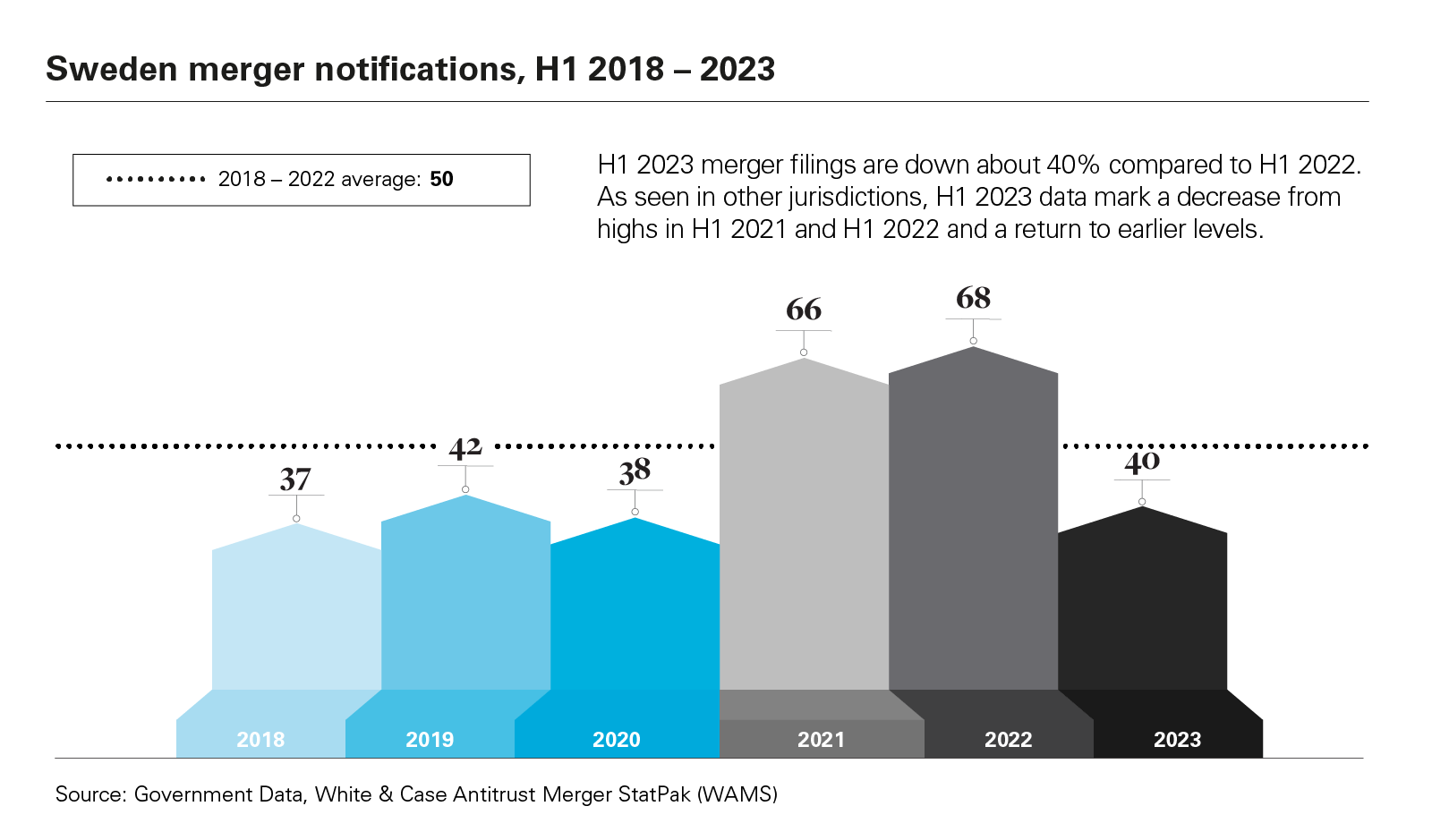 View full image: Sweden merger notifications, H1 2018 - 2023 graph (PDF)
View full image: Sweden merger notifications, H1 2018 - 2023 graph (PDF)
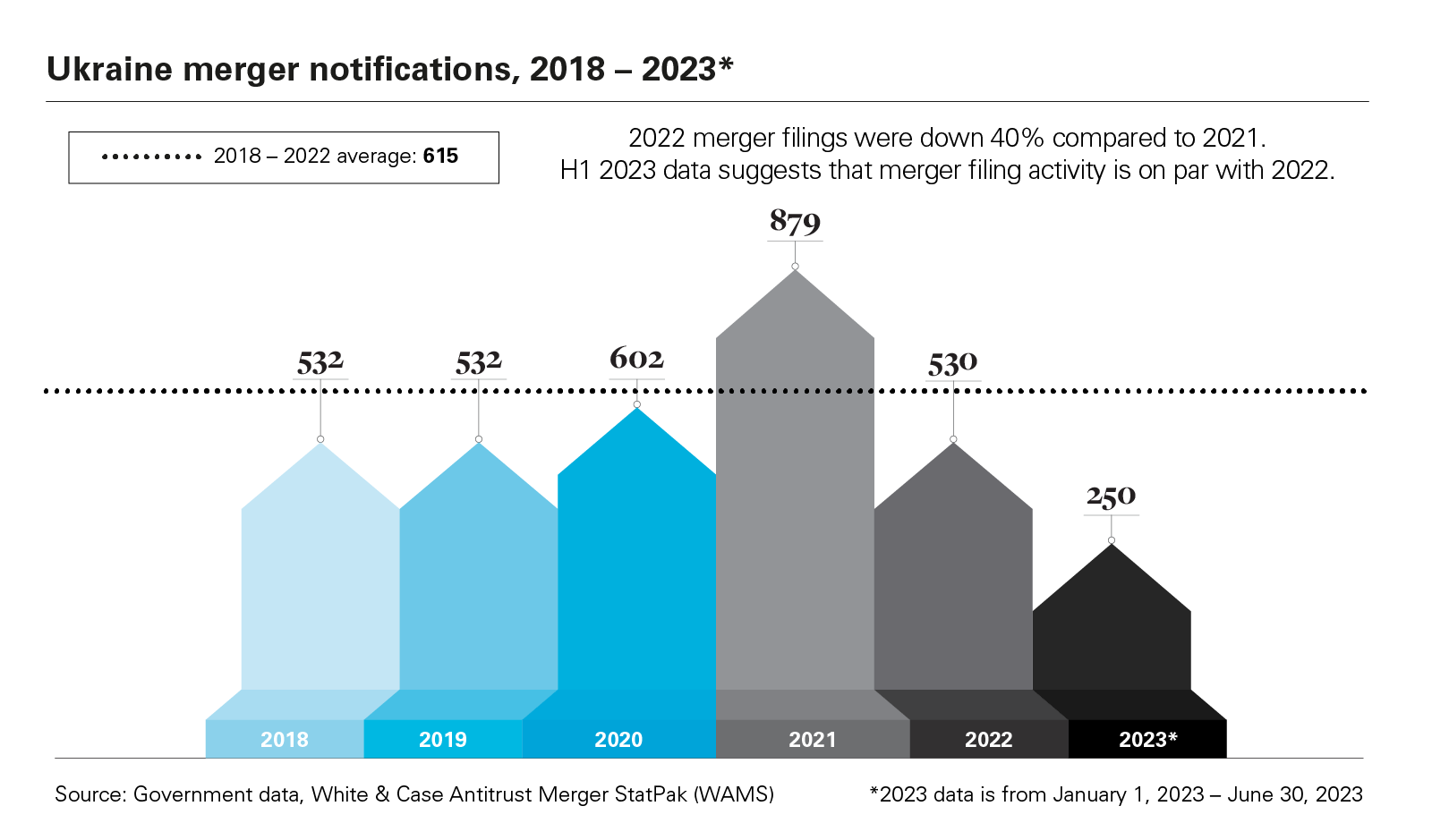 View full image: Ukraine merger notifications, 2018 - 2023* graph (PDF)
View full image: Ukraine merger notifications, 2018 - 2023* graph (PDF)
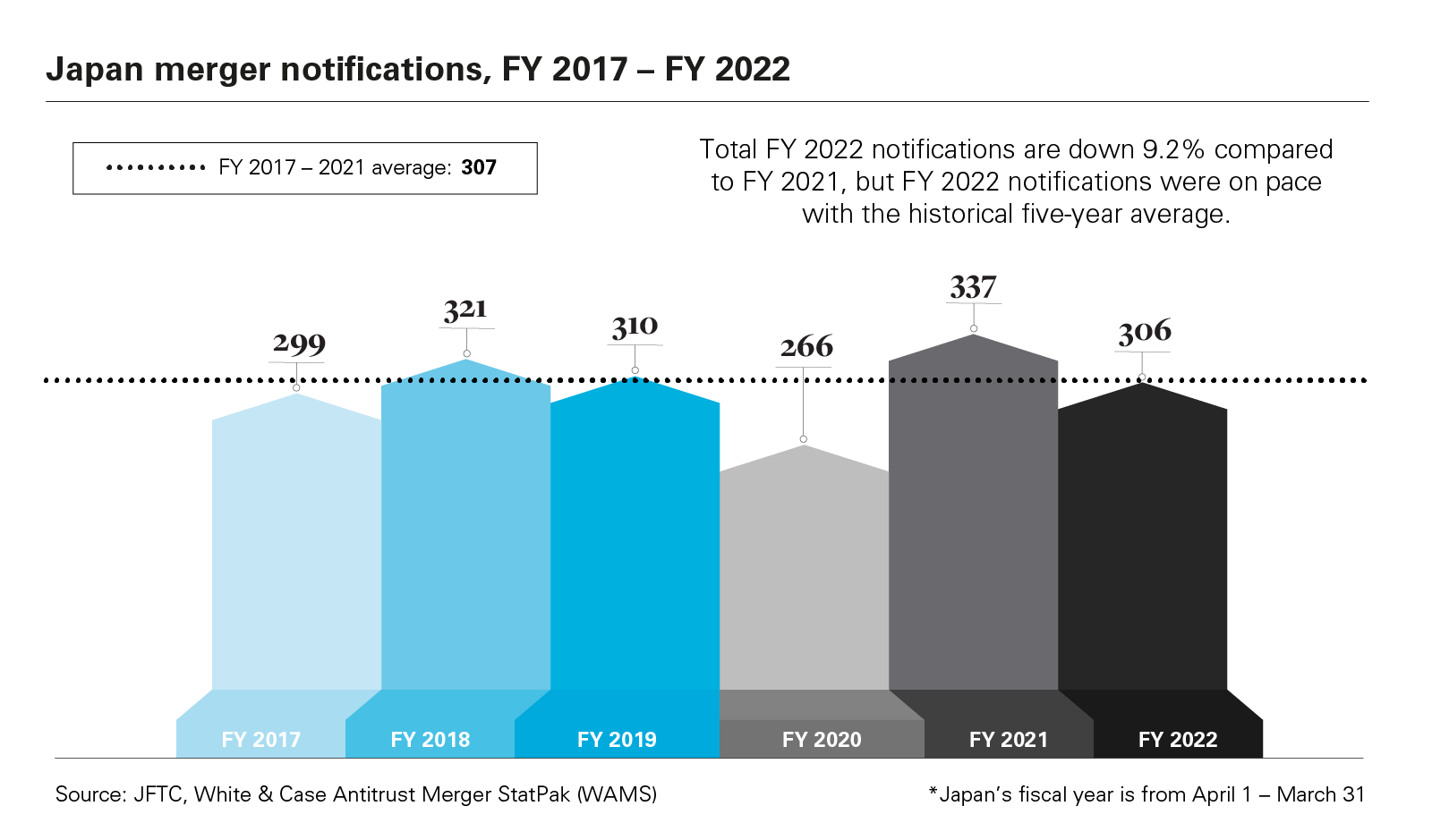 View full image: Japan merger notifications, FY 2017 - FY 2022 graph (PDF)
View full image: Japan merger notifications, FY 2017 - FY 2022 graph (PDF)
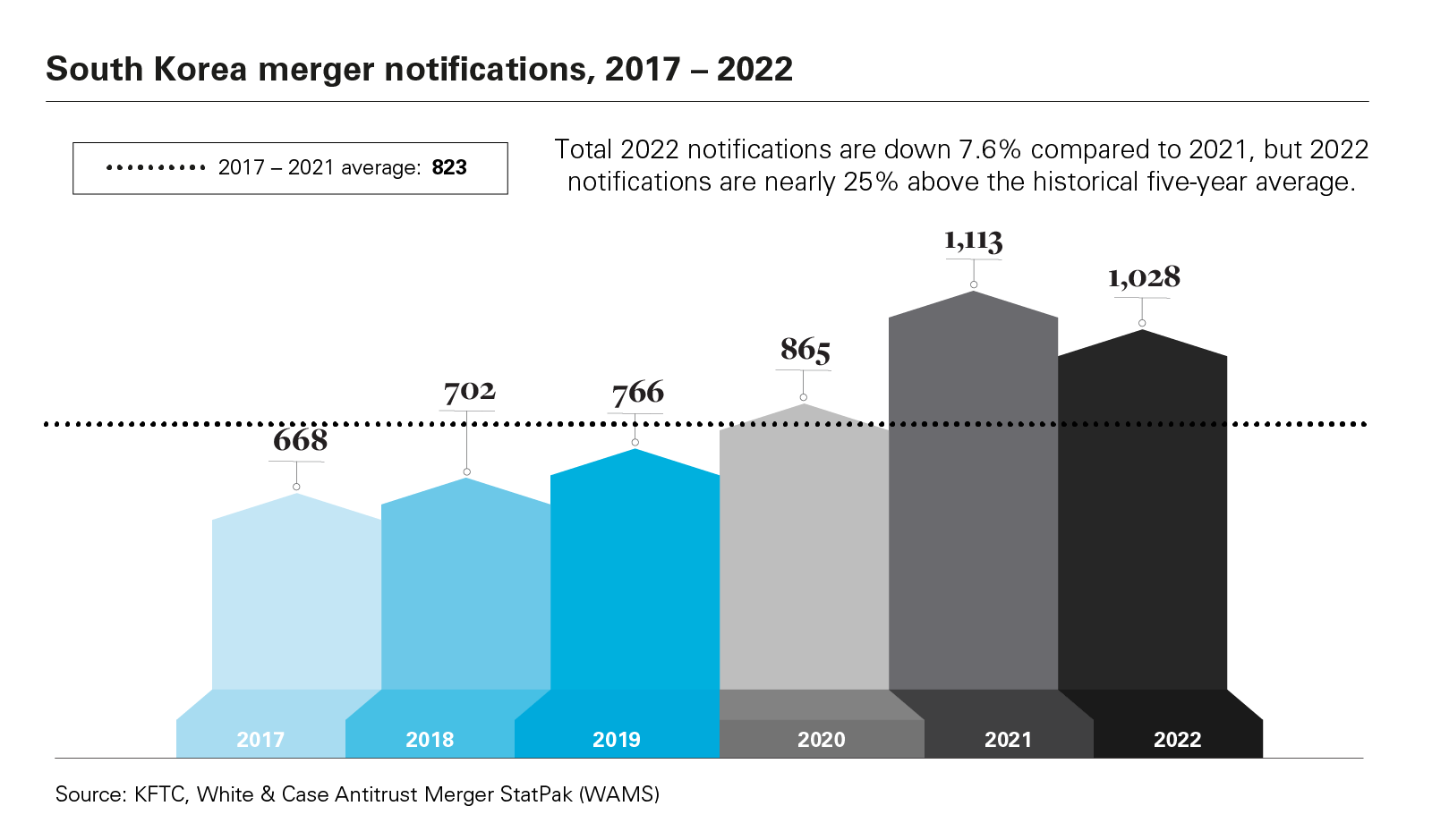 View full image: South Korea merger notifications, 2017 - 2022 graph (PDF)
View full image: South Korea merger notifications, 2017 - 2022 graph (PDF)
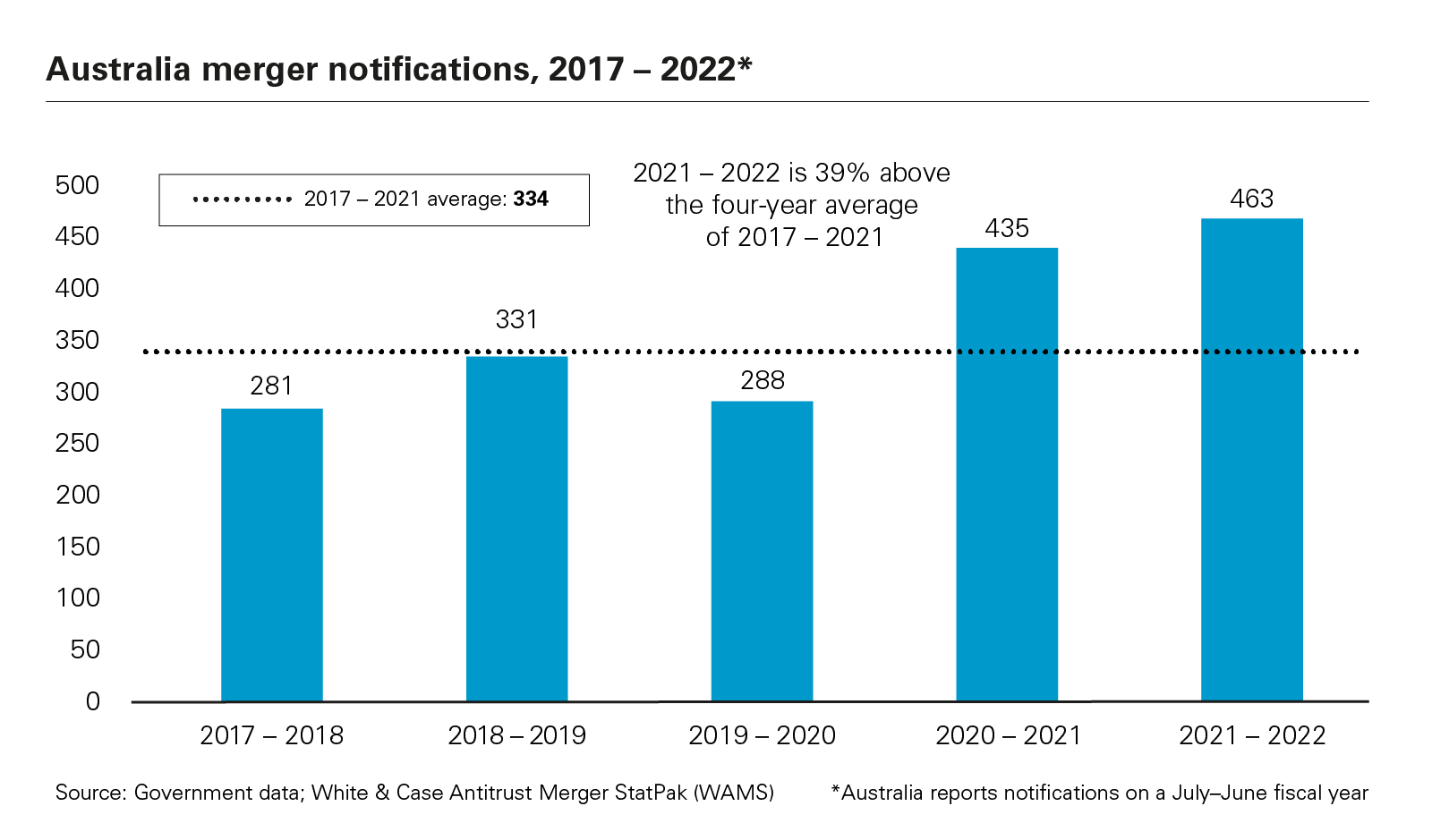 View full image: Australia merger notifications, 2017 -2022* graph (PDF)
View full image: Australia merger notifications, 2017 -2022* graph (PDF)
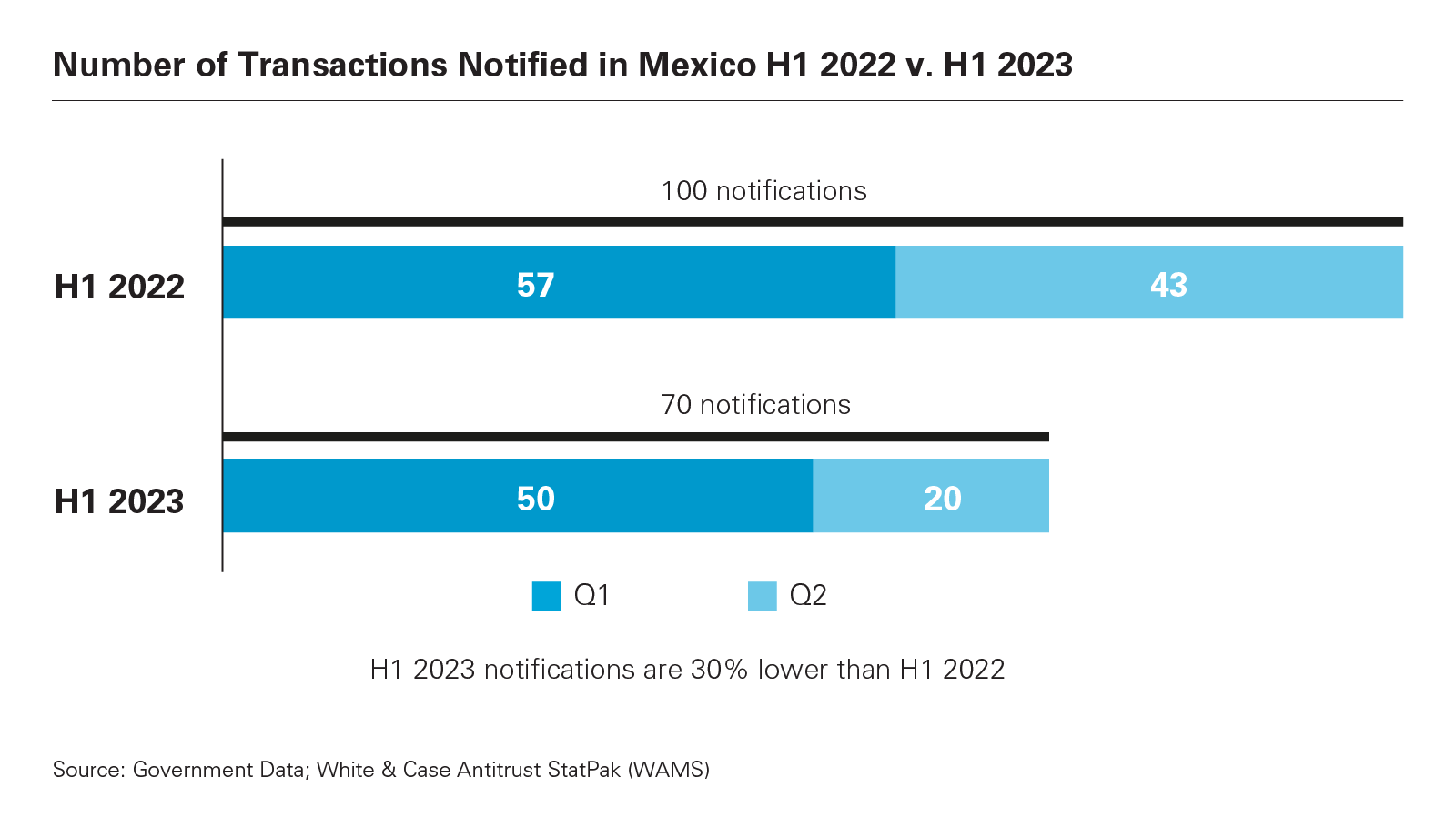 View full image: Number of Transactions Notified in Mexico H1 2022 v. H1 2023 graph (PDF)
View full image: Number of Transactions Notified in Mexico H1 2022 v. H1 2023 graph (PDF)
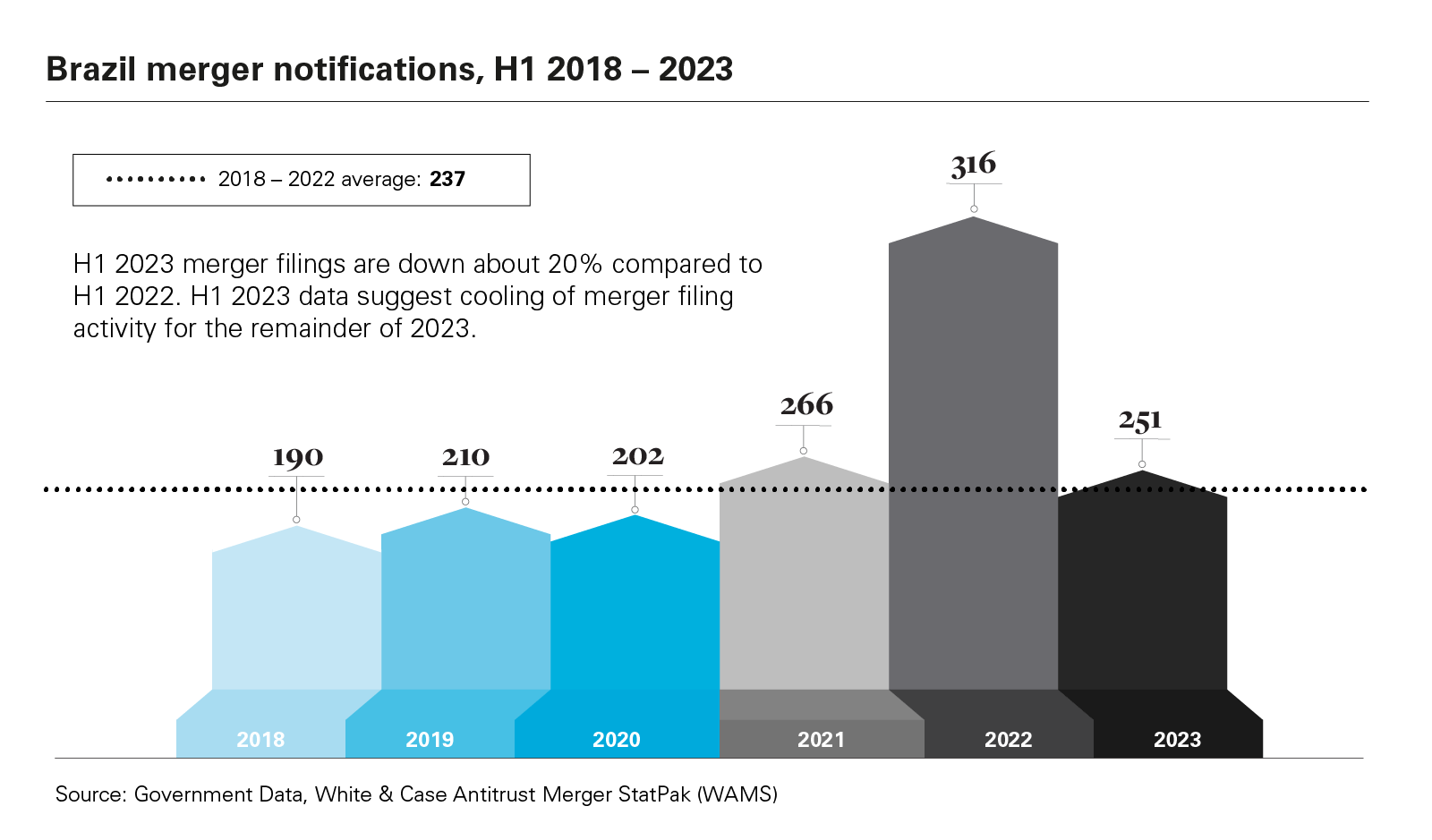 View full image: Brazil merger notifications, H1 2018 - 2023 graph (PDF)
View full image: Brazil merger notifications, H1 2018 - 2023 graph (PDF)
















